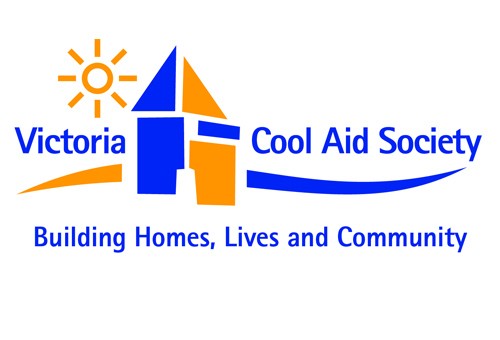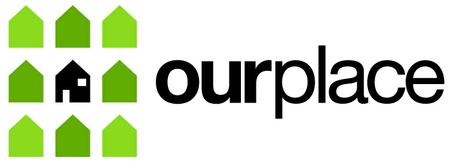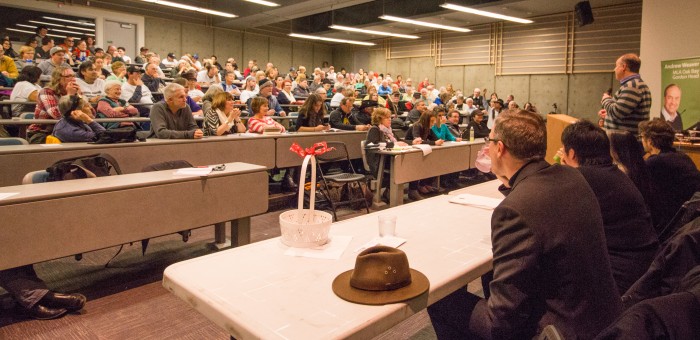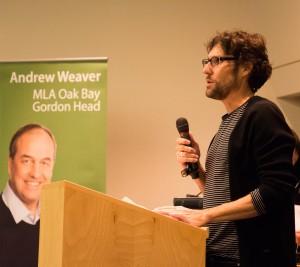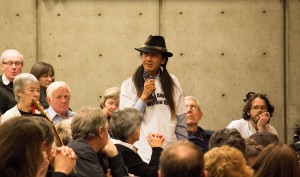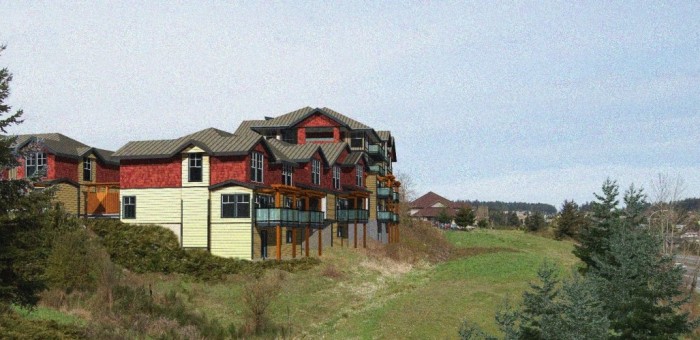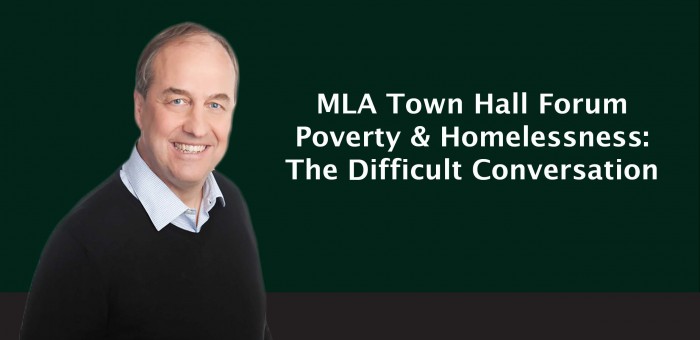Sharing Stories: Victoria Cool Aid Society – Next Steps
As part of our series on poverty and homelessness we asked people to consider sharing a story about their experiences. Sharing these stories serves as a reminder that poverty and homelessness are not a choice. It’s important for us to end the stigma and stereotypes that are too often associated with these issues. Each of us has followed a different path from the past to the present. Yet some of our paths have been rockier than others.
This week we are pleased to offer the seventh of these stories. We are grateful to the Victoria Cool Aid Society for providing it to us. Working in partnership with others to develop community-based solutions, Cool Aid provides emergency shelter, supportive housing, integrated health care and other support services to those in need.
Next Steps Transitional Shelter
Helping over 9,000 people in the Capital Region every year, the Cool Aid Society is one of the leading service providers for people who are homeless and is the largest provider of supportive housing outside of the Lower Mainland, for people who have been homeless.
Last year alone, over 1,700 individuals stayed in Cool Aid shelters and over 4,000 patients received primary health care at the Cool Aid Community Health Centre. Additionally, Cool Aid currently operates 374 apartments for people who have been homeless and this year they will begin construction of Cottage Grove Apartments in Saanich, for seniors who are currently homeless.
Cool Aid’s Next Steps Transitional Shelter, provides an opportunity for 15 emergency shelter clients to access the resources and services they need to get their lives back on track. Such services include housing, employment, financial, life skills and mentorship, as well as physical and mental health services. ‘J’ is one of those clients:
“I have spent seven years of my life on the streets of Victoria, mostly under a bridge. Life was hard, life was cold. I had tried to make the transition from streets to housing before. Unfortunately, I never had the resources to stay in housing nor the skills for the job to pay my bills.
At the beginning of this last attempt to get off the streets I heard about this place called Next Steps run by the Cool Aid Society. What they had to offer was exactly what would help me do the transition properly. I will be attending school while staying at Next Steps. I will be gaining the skill set to get a job that will pay the bills and that I will thoroughly enjoy.
The impact of all of this will be far reaching and impact my life in such a tremendous way. Next Steps is offering a chance to produce positive, outstanding people who used to think they had no chance. Next Steps has a lot to offer me and any person wanting to make the best change one can make. From under a bridge to under a roof.”
Sharing Stories: Our Place – Al’s Story
As part of our series on poverty and homelessness we asked people to consider sharing a story about their experiences. Sharing these stories serves as a reminder that poverty and homelessness are not a choice. It’s important for us to end the stigma and stereotypes that are too often associated with these issues. Each of us has followed a different path from the past to the present. Yet some of our paths have been rockier than others.
This week we are pleased to offer the sixth of these stories. We are grateful to the Our Place Society for providing it to us. Our Place provides an array of services and programs to Greater Victoria’s most vulnerable populations. Serving over 58,000 meals in October alone. Our place has experienced a 62% growth in demand for meals with their new extended winter hours.
Al’s Story
When you first meet Al, you are taken in by his eyes: clear, strong and focused. But those eyes also contain a vulnerability that tells you he is someone who has lived rough, faced difficult decisions, and known pain.
Born and raised in Victoria, Al’s life was turned upside down 11 years ago when he lost his job as a security guard. He admits that he shares responsibility for the loss as, “I was stubborn. They wanted rid of me and I gave them the excuse.”
Unable to find a new job, combined with personal troubles at home, Al ended up on the street. A short time later, his brother, Tom, lost both his job and the place where he was living, and joined Al in the vacant doorways of downtown Victoria.
“I couldn’t stay in the shelters,” says Al. “The snoring and stench of feet was too much. I’d rather sleep on the street.”
Al and his brother staked a nightly claim in a spot with an overhanging roof that helped shield them from the snow and rain.
“It has its ups and downs,” says Al. “Eighty to ninety percent of the people you meet are good, but every day has its challenges.”
One of those challenges was finding a safe place to stash his sleeping bag and extra clothes. “No matter how well you hid it, someone always sniffed it out and stole it,” he says.
The one bright spot in Al’s day was Our Place. “I’d show up every morning for breakfast,” he says. “It was the first place I turned to when I had nowhere else to go.”
The one thing that Al always had going for him was his work ethic. “I don’t ask anyone for anything,” says Al. “I would get up at six in the morning to go bottling, and was usually on my bike until ten at night. Living on the street is boring. You have to keep busy.”
Collecting bottles around Victoria also gave Al a sense of purpose as neighbourhood residents came to know his schedule, and would look out for him hauling bottles and cans on his bicycle.
“Sometimes I would be so loaded down with bottles that people would stop to take my picture,” Al says with a minimal grin. “I even got a police escort to the bottle depot once after a cop saw me piled high with 780 bottles. It was just two blocks, but I’ll always remember that.”
Another memory he’ll cherish is the generosity of some of the friends he made on the route.
“One family gave me a new sleeping bag when they heard mine got stolen,” he says. “Another stuck an envelope with forty-five bucks inside into their recycling bin at Christmas. I tried to return it, but they insisted I keep it.”
Al enjoyed bottling because it allowed him to be his own boss, which was a better fit for his personality. But Al also knew he needed to get his life back on track.
A father of two, who lost his own father at 14, Al wanted a more stable life. That goal became even more important when he took on responsibility for his two young grandchildren.
Always keeping busy, Al was spending more time at Our Place by volunteering in the hygiene area and cleaning up the courtyard. So when the Manager of Housing, John Sherratt, heard Al was ready to make a change, he suggested Al apply through the Coordinated Access to Supportive Housing (CASH) program for supportive housing.
Shortly after moving into one of our 45 transitional units, Al applied and was hired for a custodial position at Our Place, where he has been working part-time for the last four months.
“It’s really helped my self-esteem,” says Al. “And got my morals back on track.”
Having lived on the street for over a decade, Al knows he still has a way to go before he can return to sustainable, independent living. But the staff at Our Place is there to help him succeed by providing more employment skills and planning his progress to less-supported housing.
And as one look in Al’s eyes will tell you, he’s too strong to fail.
Nothing about us without us: Highlights from our town hall
“If we sit down and talk about the problem together, maybe we can come up with some solutions” – Bernice Kamano, Greater Victoria Coalition to End Homelessness Speakers Bureau
Sometimes the most important conversations are the most difficult to have. However, those conversations become much easier when they occur in an open, compassionate and inclusive environment. And that is exactly the type of environment I had the honour of being a part of last night for my Town Hall event — Poverty and Homelessness: The Difficult Conversation.
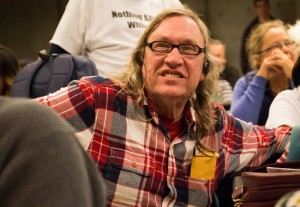 Before I delve into what was shared and what we learned last night, I’d like to once again offer my sincere thanks to Reverend Al Tysick for the time and work he put in to ensure that his family could make it to our event. I’d also like to express my deep gratitude to Reverend Al’s family and friends for sharing their profoundly moving personal stories with us. To our four wonderful panelists, I thank you on behalf of everyone in the audience for taking the time out of your busy schedules to offer us your valuable insight into the issue of poverty and homelessness. And special thanks to Cairine Green for graciously volunteering to moderate the evening. I am also blessed to be supported by truly incredible constituency and legislature staff and volunteers. Without their assistance, our town hall would simply never have happened.
Before I delve into what was shared and what we learned last night, I’d like to once again offer my sincere thanks to Reverend Al Tysick for the time and work he put in to ensure that his family could make it to our event. I’d also like to express my deep gratitude to Reverend Al’s family and friends for sharing their profoundly moving personal stories with us. To our four wonderful panelists, I thank you on behalf of everyone in the audience for taking the time out of your busy schedules to offer us your valuable insight into the issue of poverty and homelessness. And special thanks to Cairine Green for graciously volunteering to moderate the evening. I am also blessed to be supported by truly incredible constituency and legislature staff and volunteers. Without their assistance, our town hall would simply never have happened.
“We don’t need to come up with new solutions, they are already there. We need to get politicians and policy to enact the solutions.” – Bruce Wallace, assistant professor in the School of Social Work at the University of Victoria
While the discussions last night may not have provided any new, groundbreaking solutions to bring an immediate end to homelessness and poverty in Greater Victoria, they did highlight the best practice solutions that already exist and what needs to be done to put them into practice.
Some of the key issues that were discussed by our panelists included:
1) systemic failures, such as lack of government strategies for ending homelessness (both nationally and provincially) and people falling through the cracks when accessing services that are in place;
2) structural issues, including low incomes, high rents and lack of affordable and supportive housing;
3) personal circumstances, such as mental health, unemployment and family situations.
Research has found that best practice solutions to these issues include:
1) Housing First policies – like those implemented in Medicine Hat and Utah;
2) provincial poverty reduction plans – as has been proposed by the BC Poverty Reduction Coalition;
3) increasing minimum wage – which is more than $8/hour below living wage in our region;
4) increasing income assistance – which hasn’t changed in almost 10 years despite inflation and higher living costs.
“Solutions are based on philosophies that don’t resonate with aboriginal people” – Bernice Kamano
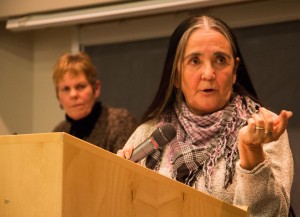 Another important issue that was highlighted last night and that too often gets overlooked when discussing poverty and homelessness is the disproportionate number of aboriginal people living on the street. In Vancouver, at least 30% of the street population identify themselves as aboriginal. Meanwhile aboriginal people make up only 2% of the city’s entire population. Given these deplorable statistics, there is a clear need for services and solutions that address the unique needs and challenges faced by aboriginal people. But creating these solutions can only be done by giving the aboriginal community a voice when planning and making decision to eradicate homelessness.
Another important issue that was highlighted last night and that too often gets overlooked when discussing poverty and homelessness is the disproportionate number of aboriginal people living on the street. In Vancouver, at least 30% of the street population identify themselves as aboriginal. Meanwhile aboriginal people make up only 2% of the city’s entire population. Given these deplorable statistics, there is a clear need for services and solutions that address the unique needs and challenges faced by aboriginal people. But creating these solutions can only be done by giving the aboriginal community a voice when planning and making decision to eradicate homelessness.
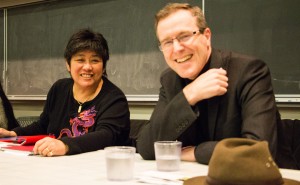 To address this need, Bernice Kamano and Andrew Wynn-Williams, Executive Director for the Greater Victoria Coalition to End Homelessness, shared with us the Coalitions current efforts to create an Aboriginal Coalition to End Homelessness. This new coalition would bring together both elected and hereditary chiefs and other members of the aboriginal community to examine the key issues behind and the solutions to the high rates of poverty and homelessness amongst aboriginal communities.
To address this need, Bernice Kamano and Andrew Wynn-Williams, Executive Director for the Greater Victoria Coalition to End Homelessness, shared with us the Coalitions current efforts to create an Aboriginal Coalition to End Homelessness. This new coalition would bring together both elected and hereditary chiefs and other members of the aboriginal community to examine the key issues behind and the solutions to the high rates of poverty and homelessness amongst aboriginal communities.
“I am a messenger for things I have learned from people, including many in the audience tonight” – Charlayne Thornton-Joe, Victoria City Council
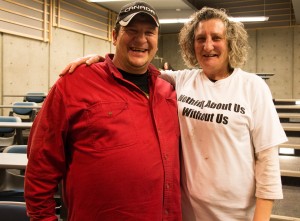 While the presentations by the panelists proved thoughtful and informative, the true highlight of the evening was the open discussion that ensued afterwards. It is not often that you find yourself in an at-capacity lecture hall, discussing issues surrounding poverty and homelessness with those who are currently homeless, those working on the front lines to end homelessness, elected officials and other members of the community.
While the presentations by the panelists proved thoughtful and informative, the true highlight of the evening was the open discussion that ensued afterwards. It is not often that you find yourself in an at-capacity lecture hall, discussing issues surrounding poverty and homelessness with those who are currently homeless, those working on the front lines to end homelessness, elected officials and other members of the community.
In an open-minded, inclusive and caring environment people were able to express their frustrations, share their stories and better understand what it means to live in poverty. Questions and comments were diverse and included inquiries about Guaranteed Livable Income policies, the need for affordable housing, the reliance on a charity model and use of emergency shelters as housing, and the costs to society of inaction versus action.
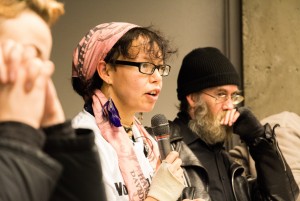 The solutions to these problems are not ones that any one person can provide. They require long-term planning, commitment and collaboration from non-profit organizations and all levels of government. However, that does not mean there is nothing that you as an individual can do to make a difference. One of the last questions that was asked may prove most meaningful to many of you: “What can average, everyday people do when faced with homelessness on the street?”
The solutions to these problems are not ones that any one person can provide. They require long-term planning, commitment and collaboration from non-profit organizations and all levels of government. However, that does not mean there is nothing that you as an individual can do to make a difference. One of the last questions that was asked may prove most meaningful to many of you: “What can average, everyday people do when faced with homelessness on the street?”
For the answer to this question our panelists directed us to the people in the audience that could respond to this question best — Reverend Al’s family. Their answer was simple and unanimous: be compassionate. Smile, say hello, have a conversation. Don’t act like they’re invisible. Treat them like you would anyone else you pass on the street, because we’re all just people and we all need to know that someone cares.
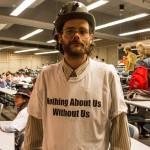 I made a commitment yesterday — a commitment to continue raising awareness and offering solutions to systemic issues of poverty and homelessness over the weeks and months ahead. And I promised that at our next town hall, we will come to you Reverend Al and family.
I made a commitment yesterday — a commitment to continue raising awareness and offering solutions to systemic issues of poverty and homelessness over the weeks and months ahead. And I promised that at our next town hall, we will come to you Reverend Al and family.
Photos Credit: Britt Swoveland
Sharing Stories: Society of St. Vincent de Paul Victoria – Rosalie’s Village
As part of our series on poverty and homelessness we asked people to consider sharing a story about their experiences. Sharing these stories serves as a reminder that poverty and homelessness are not a choice. It’s important for us to end the stigma and stereotypes that are too often associated with these issues. Each of us has followed a different path from the past to the present. Yet some of our paths have been rockier than others.
This week we are pleased to offer the fifth of these stories. We are grateful to the Society of Saint Vincent de Paul Victoria for providing it to us. St Vincent de Paul is a non-profit organization dedicated to serving the needs of any person who needs their help.
Rosalie’s Village Spring Start
After almost 7 years of planning, Rosalie’s Village, a Saint Vincent de Paul (SVDP) housing project for homeless women and children, is expected to begin construction in March 2015. Inspired by the saying, “It takes a village to raise a child” the concept of this project is to provide housing and accessibility to the many services the CRD offers to vulnerable women and children. Working with many partners builds community and the confidence to move forward.
The vision is two-fold: to make available safe, affordable housing for young mothers with small children on their journey to independence and the transition into market rental housing; to offer a home to older women coming out of various homeless/at risk situations until they qualify for appropriate seniors housing. Needs assessments reveal that this type of housing is much needed in the CRD. It is estimated the region needs at least 250 supportive housing units and 1,500 affordable/low-market units.
Rosalie’s Village will be a 42 unit housing project which will include an infant/toddler daycare with capacity for 37 children, priority given to residents of Rosalie’s Village. This daycare, Mary’s Place, will provide secure childcare so that their mothers can focus on bettering their lives and those of their children through education and employment. It is difficult to break the cycle of poverty, but it has been identified that finding a home is integral to success along with access to childcare, education and employment. Giving young mothers a ‘hand-up’ will affect subsequent generations in achieving a good standard of living. The children of Mary’s Place will be able to attend free of charge to the mothers through the federal day care subsidy and a top-up provided by Saint Vincent de Paul.
In addition to donating the land, the Society is committed to raising $1.2 million dollars toward this project. To date the Society has raised over $700,000 toward that goal. Pacifica Housing and M’akola Housing will assist with intake and referrals. Other partnerships include the District of Saanich, Capital Regional District, The Greater Victoria Coalition to End Homelessness, CMHC, BC Housing, Joe Newell Architects and M’akola Development Services.
In order to achieve the goal of transitioning to independence, several programs will operate from Rosalie’s Village. There will be resident support workers who will develop a plan with each tenant to map out a road to independence. This will be a case managed agreement between the Society and the tenant and may involve attending high school or college or beginning a career path. Placement and the transition to seniors housing for the older women will also be done with the assistance of the resident support workers. As well there will be a Social Concern Office in the building where tenants can access services include work training programs, women’s day programs, life skills training, an income tax program etc. All of the foregoing services are already funded by the Society through donations and sale of goods at the six Victoria area thrift stores.
The Society has almost 100 years of experience providing support to those in need through home visits throughout the Capital Regional District. In fact, SVDP is celebrating its 100th anniversary of service on Vancouver Island in 2016. Our home visitors would extend this support to assist the tenants of Rosalie’s Village, offering a variety of supports including the donation of food and clothing and advocacy in accessing local services.
The Society is counting on the support of Victoria residents and accepts donations in person, by phone, by mail, or over the Internet. More information is available on the Rosalie’s Village website: http://www.rosaliesvillage.ca/
Rosalie’s Village web site is www.rosaliesvillage.ca
Our Society web site is www.svdpvictoria.com
We also have a facebook page https://www.facebook.com/ssvpvancouver?ref=aymt_homepage_panel
Spreading awareness also really helps and “I Support Rosalies” buttons are available and can be ordered through our administration office at 4349 West Saanich Road, Victoria, BC Canada (250) 727-0007 or info@svdpvictoria.com
MLA Town Hall – Poverty and Homelessness: The Difficult Conversation
As part of our on-going series on poverty and homelessness we will be hosting an MLA Town Hall Forum entitled Poverty and Homelessness: The Difficult Conversation.
The forum will feature four expert panelists including Andrew Wynn-Williams, the executive director of the Greater Victoria Coalition to End Homelessness, Charlayne Thornton-Joe, a Victoria City Councillor and member of the Regional Housing Trust Fund Commission, Bruce Wallace, an assistant professor and researcher at the University of Victoria, and Bernice Kamano, a member of the Greater Victoria Coalition to End Homelessness Speakers Bureau.
Each panelist will give a brief presentation discussing why they got involved in their work, what they believe are the biggest obstacles in addressing poverty and homelessness, and what they see as the best solutions. Following the presentations will be an open Q&A where audience members may bring forth any questions they have for our panelists or for Andrew himself.
The event will take place from 7:00pm to 9:00pm on Wednesday, February 4th, in room A120 of the David Turpin Building at the University of Victoria. The nearest parking is located in the Centennial Stadium parking lot, at a flat rate of $2.50 after 6pm.
We hope you will all join us for what is sure to be an informative and eye-opening discussion on the issues surrounding poverty and homelessness in our community and throughout our province.
Donations of non-perishable food items and cash for the Mustard Seed Food Bank and Our Place Society are welcome.
If you have not been following our series over the last few weeks, please visit the links below to read more. And check back later this week for our next installment.
- Part 1: Homelessness in Greater Victoria
- Part 2: Contributing Factors to Homelessness
- Part 3: Cost Savings of Housing-First
- Part 4: The Government’s Role in Ending Poverty and Homelessness

